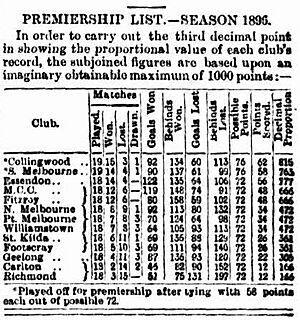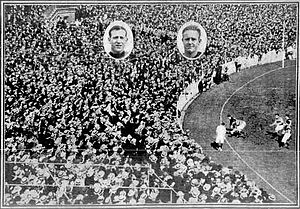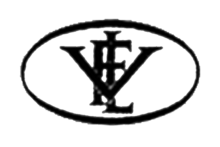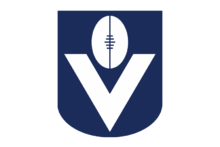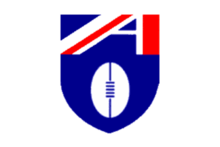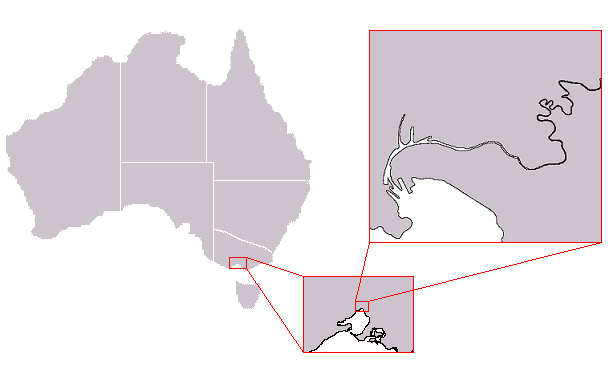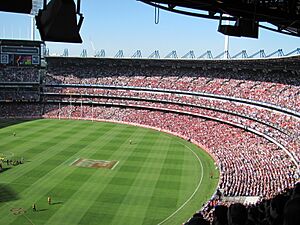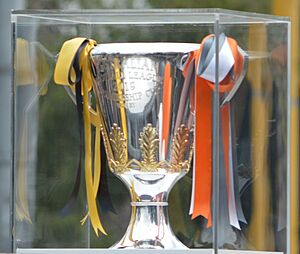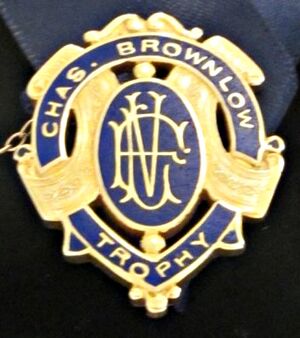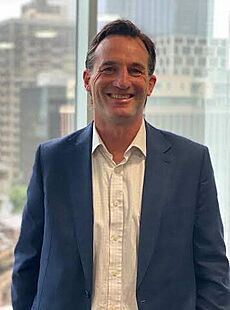Australian Football League facts for kids
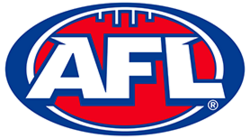
AFL logo since 2000
|
|
| Formerly | Victorian Football League (VFL) (1897–1990) |
|---|---|
| Sport | Australian rules football |
| Founded | 2 October 1896 |
| Inaugural season | 1897 |
| CEO | Andrew Dillon |
| No. of teams | 18 |
| Headquarters | Melbourne, Victoria, Australia |
| Region | |
| Current premiers | Brisbane Lions (4th premiership) |
| Most premiers | Carlton Collingwood Essendon (16 premierships) |
| TV partner(s) | Australia: Seven Network Fox Footy New Zealand: Sky Sport International: See list |
| Streaming partner(s) | 7plus (Australia) Kayo Sports (Australia) WatchAFL (Overseas) |
| Sponsor(s) | Toyota |
| Domestic cup(s) |
|
| International cup(s) | Australian Football International Cup |
| Official website | afl.com.au |
The Australian Football League (AFL) is Australia's top professional competition for Australian rules football. It started in 1896 as the Victorian Football League (VFL). Its first season was in 1897.
The league changed its name to the Australian Football League in 1990. This happened after it grew to include teams from other Australian states in the 1980s. The AFL also creates the rules for Australian football, which other leagues use.
Currently, 18 teams from five Australian states play in the AFL. A new team from Tasmania will join in 2028, making it 19 teams. AFL games have been played all over Australia, and even in New Zealand and China.
The AFL season runs from March to September. Each team plays 23 regular season matches. The team with the best record wins the minor premiership. The top eight teams then play in a four-round finals series. This leads to the AFL Grand Final, usually held at the Melbourne Cricket Ground. The Grand Final winners are called the premiers. They receive the premiership cup and a flag.
Carlton, Collingwood, and Essendon are the most successful clubs. Each has won 16 premierships. The Brisbane Lions are the current premiers, having won the 2024 AFL Grand Final.
History of the AFL
Early Years: VFL Era (1897–1989)
How the League Began
Some of the AFL's oldest clubs helped create Australian football. The Melbourne Football Club wrote the first rules in 1858. Geelong started in 1859.
The Victorian Football Association (VFA) began in 1877. It quickly became Victoria's main football competition. In the 1890s, stronger VFA clubs wanted more control. They felt they contributed more money to the game.
In 1896, six strong clubs left the VFA. These were Collingwood, Essendon, Fitzroy, Geelong, Melbourne, and South Melbourne. They invited Carlton and St Kilda to join them. Together, they formed a new league called the Victorian Football League (VFL).
First VFL Seasons and Growth
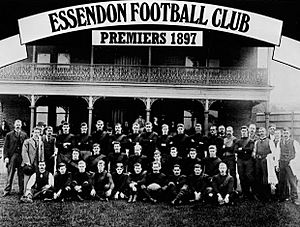
The VFL's first season was in 1897. It introduced new ideas to make games more exciting. These included a finals tournament, not just giving the premiership to the team with the best record. They also set up the modern scoring system: six points for a goal and one for a behind.
The VFL quickly became the most important football league in Victoria. In 1908, two more teams joined: Richmond and University Football Club. By 1911, clubs could pay players. University left the VFL in 1914 because its players stayed amateur.
The VFL premiers sometimes played against the South Australian Football League premiers. This was for the "Championship of Australia." South Australian clubs won most of these early championships.
New Clubs Join the VFL (1915–1945)
In 1916, "district football" started. This meant new players in Melbourne had to play for clubs based on where they lived. In 1925, the VFL grew from nine to twelve teams. Footscray, Hawthorn, and North Melbourne joined from the VFA.
North Melbourne and Hawthorn struggled for a long time. Footscray adapted more easily. From 1927 to 1930, Collingwood made history. They became the only VFL/AFL team to win four premierships in a row.
Post-War Golden Years (1946–1975)
In 1952, the VFL held a "national day." All six matches were played outside Melbourne. Footscray won its first premiership in 1954.
The Melbourne Football Club became very strong in the 1950s and early 1960s. They won five premierships, including three in a row.
Television coverage for the VFL started in 1957. At first, only the last quarter of games could be shown live. The VFL worried that TV would reduce crowds. So, in 1960, no TV coverage was allowed. In 1961, replays were introduced.
In 1959, the VFL planned to build its own large stadium, VFL Park. This would give them independence from the Melbourne Cricket Ground. VFL Park was designed to hold many fans.
Television had a big impact in the 1960s. Fans rushed home to watch replays. In 1970, VFL Park opened. The 1970 VFL Grand Final was a famous game. Carlton came back from 44 points down to beat Collingwood. A record crowd of 121,696 watched.
VFL Becomes More Powerful (1976–1981)
In 1976, the National Football League (NFL) started a "Night Series." This competition included teams from the VFL and other state leagues. Games were played at night and shown live on TV.
The VFL decided to start its own night competition in 1977. It offered better TV and sponsorship deals. This made the VFL much stronger. By 1980, clubs from other states joined the VFL's night competition. This was a big step in the VFL becoming a national league.
The VFL's night competition eventually became the pre-season competition. During this time, wealthier VFL clubs gained an advantage. They could recruit more players from outside their local areas.
Growth and Challenges (1982–1989)
The 1980s brought big changes to Australian football. The VFL was the most popular league. It started to expand into other states. This led to rising costs for clubs.
The South Melbourne Swans team moved to Sydney in 1982. They became the Sydney Swans. This helped the VFL expand its reach.
In 1986, the VFL allowed two new teams to join. These were the Brisbane Bears and the West Coast Eagles. They started playing in 1987. These new teams paid large fees to join. These fees helped struggling VFL clubs like Footscray and Fitzroy.
New game times also started in the 1980s. Sydney began playing home games on Sunday afternoons. North Melbourne started playing on Friday nights. These are now common times for all teams.
The first national draft was introduced in 1986. A salary cap was added in 1987. This helped control how much clubs spent on players.
AFL Era (1990–Present)
The league was renamed the Australian Football League (AFL) in 1990. This showed that it was now a national competition.
Becoming a National League (1990–2010)
In 1990, the AFL Players Association (the players' union) signed its first agreement. This set out wages and conditions for players. Football became a full-time job for many.
In 1990, the Port Adelaide Football Club wanted to join the AFL. Instead, a new team called the Adelaide Crows was formed. They joined in 1991. The West Coast Eagles became the first non-Victorian team to reach the Grand Final in 1991. They won premierships in 1992 and 1994. In 1995, Fremantle joined, becoming the second team from Western Australia.
In 1996, some Victorian clubs faced money problems. Fitzroy was too weak to continue alone. They merged with Brisbane to form the Brisbane Lions. This allowed Port Adelaide to join the AFL in 1997.
During the 1990s, Melbourne-based teams moved to larger stadiums. They left their smaller suburban grounds. By 2005, all Melbourne teams played at the MCG or Marvel Stadium. In 1999, the AFL sold VFL Park. The money helped build a new stadium at Melbourne's Docklands.
The 18-Team Era (2011–Present)
In the late 2000s, the AFL wanted to have a team on the Gold Coast. In 2008, the league decided to add two new teams. The Gold Coast Suns joined in 2011 as the 17th team. The Greater Western Sydney Giants, representing Western Sydney and Canberra, joined in 2012 as the 18th team.
On April 25, 2013, the first AFL game for premiership points was played outside Australia. It was at Westpac Stadium in Wellington, New Zealand. St Kilda played Sydney on Anzac Day.
A national women's league, AFLW, started in 2017. Eight AFL clubs had teams in the first season. All 18 AFL clubs now have women's teams.
On May 14, 2017, Port Adelaide and Gold Coast played the first AFL game for premiership points in Shanghai, China.
The 2020 AFL season was greatly affected by the COVID-19 pandemic. Games were played without crowds. The season was shorter. The Grand Final was held in Brisbane, outside Victoria, for the first time. The 2021 Grand Final was played in Perth due to lockdowns in Melbourne.
AFL Clubs
The AFL has a single league table. There are no separate divisions. The league started with eight teams in Victoria in 1897. Over time, teams were added, moved, or merged. Now there are 18 teams.
In 1990, the league became the Australian Football League. This showed its national reach. Most teams (ten) are still in Victoria, mainly in Melbourne. New South Wales, Queensland, South Australia, and Western Australia each have two teams. Tasmania will get a team in 2028.
Current Clubs
| Club | Colours | Moniker | State | Home venue | 2024 members |
Est. | Former league | VFL/AFL seasons | VFL/AFL premierships | ||
|---|---|---|---|---|---|---|---|---|---|---|---|
| First | Total | Total | Most recent | ||||||||
| Adelaide | Crows | South Australia | Adelaide Oval | 75,477 | 1990 | — | 1991 | 34 | 2 | 1998 | |
| Brisbane Lions | Lions | Queensland | The Gabba | 63,268 | 1996 | — | 1997 | 28 | 4 | 2024 | |
| Carlton | Blues | Victoria | Marvel Stadium | 106,345 | 1864 | VFA | 1897+ | 128 | 16 | 1995 | |
| Collingwood | Magpies | Victoria | Melbourne Cricket Ground | 110,628 | 1892 | VFA | 1897+ | 128 | 16 | 2023 | |
| Essendon | Bombers | Victoria | Marvel Stadium | 83,664 | 1872 | VFA | 1897+ | 126† | 16 | 2000 | |
| Fremantle | Dockers | Western Australia | Optus Stadium | 62,237 | 1994 | — | 1995 | 30 | 0 | — | |
| Geelong | Cats | Victoria | GMHBA Stadium | 90,798 | 1859 | VFA | 1897+ | 125† | 10 | 2022 | |
| Gold Coast | Suns | Queensland | People First Stadium | 26,157 | 2009 | — | 2011 | 14 | 0 | — | |
| Greater Western Sydney | Giants | New South Wales | Engie Stadium | 36,629 | 2010 | — | 2012 | 13 | 0 | — | |
| Hawthorn | Hawks | Victoria | Melbourne Cricket Ground | 83,823 | 1902 | VFA | 1925 | 100 | 13 | 2015 | |
| Melbourne | Demons | Victoria | Melbourne Cricket Ground | 65,479 | 1858 | VFA | 1897+ | 125† | 13 | 2021 | |
| North Melbourne | Kangaroos | Victoria | Marvel Stadium | 50,628 | 1869 | VFA | 1925 | 100 | 4 | 1999 | |
| Port Adelaide | Power | South Australia | Adelaide Oval | 66,015 | 1870 | SANFL | 1997 | 28 | 1 | 2004 | |
| Richmond | Tigers | Victoria | Melbourne Cricket Ground | 98,489 | 1885 | VFA | 1908 | 117 | 13 | 2020 | |
| St Kilda | Saints | Victoria | Marvel Stadium | 60,467 | 1873 | VFA | 1897+ | 126† | 1 | 1966 | |
| Sydney | Swans | New South Wales^ | Sydney Cricket Ground | 73,757 | 1874 | VFA | 1897+ | 127† | 5 | 2012 | |
| West Coast | Eagles | Western Australia | Optus Stadium | 103,498 | 1986 | — | 1987 | 38 | 4 | 2018 | |
| Western Bulldogs | Bulldogs | Victoria | Marvel Stadium | 62,328 | 1877 | VFA | 1925 | 100 | 2 | 2016 | |
| ^ denotes that the club relocated from a different state at some point in its existence + denotes that the club was a founding member of the VFL † denotes that the club did not participate in one or more seasons due to one or both of the World Wars |
|||||||||||
Future Clubs
| Club | Colours | Moniker | State | Home venue | Expected first season |
|---|---|---|---|---|---|
| Tasmania | Devils | Tasmania | Macquarie Point Stadium | 2028 |
Former Clubs
Only one club, University, has left the league since 1897. It stopped playing in 1914. This was because it was an amateur club and couldn't compete with paid players. Two other clubs, Fitzroy and the Brisbane Bears, merged in 1996 to form the Brisbane Lions.
| Club | Colours | Moniker | State | Home venue | Est. | Former league | VFL/AFL seasons | VFL/AFL premierships | |||
|---|---|---|---|---|---|---|---|---|---|---|---|
| First | Last | Total | Total | Last | |||||||
| Brisbane Bears | Bears | Queensland | Carrara Stadium | 1986 | — | 1987 | 1996 | 10 | 0 | — | |
| Fitzroy | Lions | Victoria | Brunswick Street Oval | 1883 | VFA | 1897+ | 1996 | 100 | 8 | 1944 | |
| University | Students | Victoria | Melbourne Cricket Ground | 1859 | MJFA | 1908 | 1914 | 7 | 0 | — | |
| + denotes that the club was a founding member of the VFL | |||||||||||
Timeline of Clubs
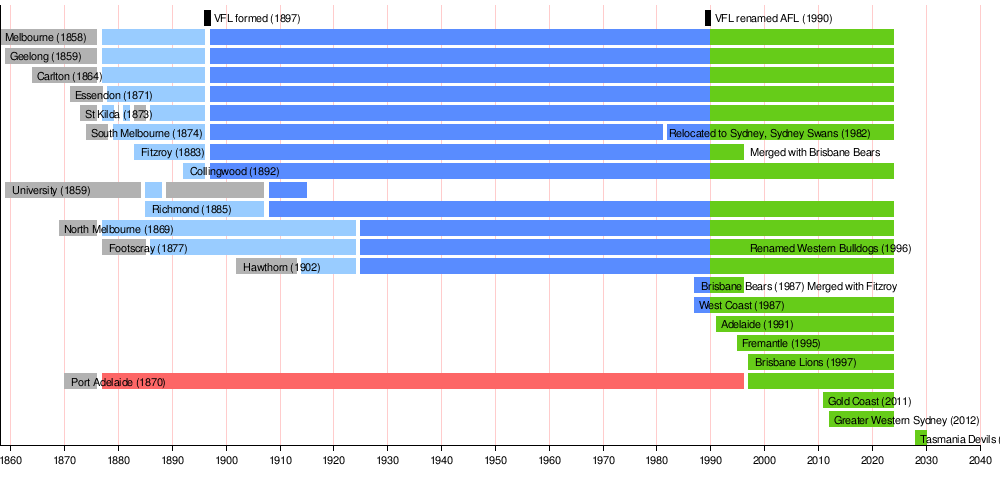
Non-formal/junior competitions †
Victorian Football Association (1877) †
Victorian Football League (1897, later renamed AFL)
Australian Football League (1990, formerly VFL)
South Australian National Football League (1877) †
† Not all teams shown. These competitions are current.
AFL Venues
There have been 50 different grounds used in VFL/AFL history. The Melbourne Cricket Ground (MCG) is the largest. It can hold over 100,000 people. The MCG hosts the Grand Final every year.
Six teams use the MCG as their home ground. Docklands Stadium (Marvel Stadium) in Melbourne is used by five teams. Adelaide Oval and Perth Stadium are used by two teams each. The AFL has owned Marvel Stadium since 2016.
Most early VFL grounds were in Melbourne suburbs. Now, AFL games are played in every state and territory of Australia. In 2013, the first AFL game for premiership points outside Australia was played in Wellington, New Zealand.
Current Venues
These venues are used for AFL matches in the 2025 AFL season.
| Melbourne Cricket Ground | Optus Stadium | Marvel Stadium | Adelaide Oval |
|---|---|---|---|
| Melbourne, Victoria | Perth, Western Australia | Melbourne, Victoria | Adelaide, South Australia |
| Capacity: 100,024 | Capacity: 61,266 | Capacity: 56,347 | Capacity: 53,500 |
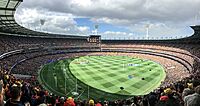 |
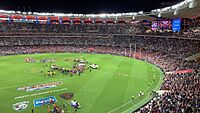 |
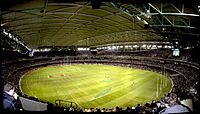 |
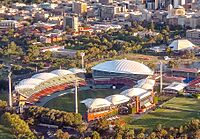 |
| Sydney Cricket Ground | GMHBA Stadium | The Gabba | People First Stadium |
| Sydney, New South Wales | Geelong, Victoria | Brisbane, Queensland | Gold Coast, Queensland |
| Capacity: 48,000 | Capacity: 40,000 | Capacity: 37,000 | Capacity: 25,000 |
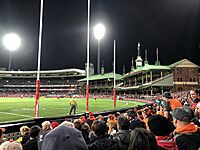 |
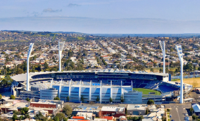 |
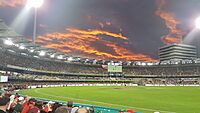 |
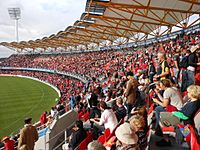 |
| Engie Stadium | Ninja Stadium | University of Tasmania Stadium | Manuka Oval |
| Sydney, New South Wales | Hobart, Tasmania | Launceston, Tasmania | Canberra, Australian Capital Territory |
| Capacity: 23,500 | Capacity: 19,500 | Capacity: 15,000 | Capacity: 15,000 |
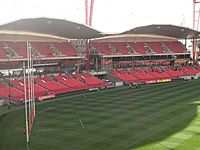 |
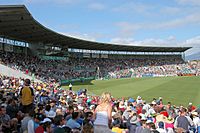 |
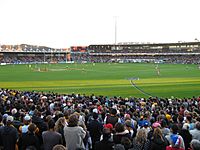 |
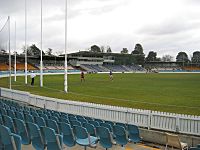 |
| TIO Stadium | Mars Stadium | Norwood Oval | TIO Traeger Park |
| Darwin, Northern Territory | Ballarat, Victoria | Adelaide, South Australia | Alice Springs, Northern Territory |
| Capacity: 12,215 | Capacity: 11,000 | Capacity: 9,700 | Capacity: 7,200 |
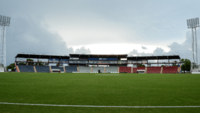 |
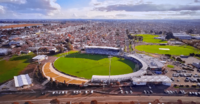 |
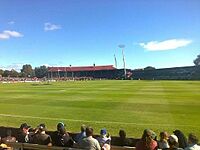 |
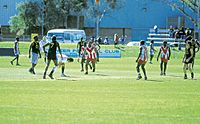 |
| Hands Oval | Barossa Park | ||
| Bunbury, Western Australia | Lyndoch, South Australia | ||
| Capacity: 8,000 | Capacity: 5,000 | ||
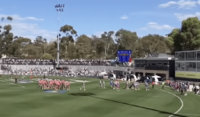 |
|||
AFL Players
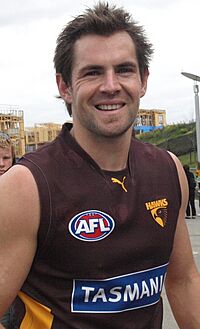
Most AFL players join the league through the AFL draft. This happens at the end of each season. Some players come from other sports or from other countries. The best 22 players and coach each year are chosen for the All-Australian team.
The AFL has rules about how many players each club can have. Teams usually have 38 to 40 senior players. They also have 4 to 6 rookie players. Clubs can trade players after the season. They can also pick new players through drafts. The national draft is the main way to get new players.
Player Salaries
The AFL has a "salary cap" to keep teams fair. This limits how much money clubs can spend on players. In 2013, the salary cap was about $9.1 million. It has increased a lot since 1990.
Player salaries are usually not public. However, top players can earn over $1 million a year. In 2017, player salaries increased by 20%. This meant the average player earned about $371,000.
If clubs break salary cap rules, they can be fined. They might also lose draft picks or premiership points.
Player Backgrounds
In 2011, there were 801 players on AFL lists. They came from all over Australia. About 9% of AFL players are Indigenous Australians. This is higher than their percentage in the general Australian population.
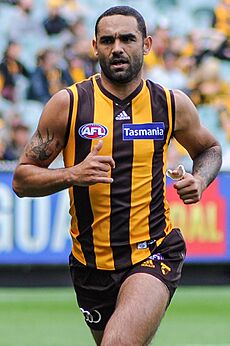
In 2011, 12 players were recruited from outside Australia. Most were from Ireland, who used to play Gaelic football. The AFL has programs to find players from other countries.
Season Structure
Pre-season Games
Before the main season, teams play practice matches. These are called the Marsh Community Series. All 18 clubs play two matches each. These games happen in February and early March. They help teams get ready for the season.
Premiership Season
The AFL home-and-away season lasts for 24 rounds. It starts in mid-March and ends in late August. Each team plays 23 matches. They play 11 home games, 11 away games, and one neutral game. Teams get four points for a win and two for a draw.
Teams are ranked by points. If teams have the same points, "percentage" is used. This is calculated by dividing points scored by points conceded.
Special Rounds and Matches
Some teams play each other at special times each year. A big one is the Anzac Day clash between Collingwood and Essendon at the MCG. Other important games include the King's Birthday match and the Easter Monday clash.
Sir Doug Nicholls Round
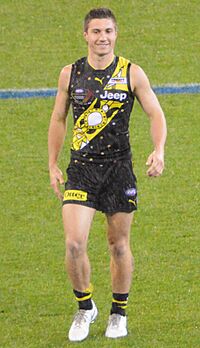
The Indigenous Round is a very popular themed round. It started in 2007. The Dreamtime at the 'G match is a highlight of this round. It often draws over 80,000 fans.
In 2016, the round was named after Sir Doug Nicholls. He was a VFL player and a state governor. During this round, players wear special jerseys. These jerseys feature artwork by Indigenous artists. Some clubs even use Indigenous names for the round.
Finals Series
The top eight teams at the end of the season play in a four-week finals series. This happens in September. It ends with the AFL Grand Final. The Grand Final decides the premiers. It is usually played at the Melbourne Cricket Ground.
The winning team gets a silver premiership cup and a navy blue flag. Each player on the winning team also gets a premiership medallion. The flag is traditionally shown at the team's first home game the next season.
AFL Awards
- Brownlow Medal – for the fairest and best player, voted by umpires.
- Coleman Medal – for the player who kicks the most goals in the regular season.
- All-Australian team – a team of 22 players chosen as the best in their positions.
- Rising Star Award – for the best young player (under 21 with few games played).
- Norm Smith Medal – for the best player in the Grand Final.
- Jock McHale Medal – for the coach of the premiership-winning team.
- Mark of the Year – for the best or most amazing mark (catch) during the season.
- Goal of the Year – for the best or most amazing goal during the season.
- Leigh Matthews Trophy – for the best player, voted by the players themselves.
- Ron Barassi Medal - for the winning captain in the Grand Final. This award started in 2024. It honors Ron Barassi, a famous player and coach.
Team of the Century
In 1996, the "AFL Team of the Century" was named. This celebrated 100 years of the VFL/AFL.
| B: | Bernie Smith (Geelong, West Adelaide) | Stephen Silvagni (Carlton) | John Nicholls (Carlton) |
| HB: | Bruce Doull (Carlton) | Ted Whitten (Footscray) Captain | Kevin Murray (Fitzroy, East Perth) |
| C: | Francis Bourke (Richmond) | Ian Stewart (Hobart, St Kilda, Richmond) | Keith Greig (North Melbourne) |
| HF: | Alex Jesaulenko (Carlton, St Kilda) | Royce Hart (Richmond) | Dick Reynolds (Essendon) |
| F: | Leigh Matthews (Hawthorn) | John Coleman (Essendon) | Haydn Bunton Sr. (Fitzroy, Subiaco, Port Adelaide) |
| Foll: | Graham 'Polly' Farmer (Geelong, East Perth, West Perth) | Ron Barassi (Melbourne, Carlton) | Bob Skilton (South Melbourne) |
| Int: | Gary Ablett Sr. (Hawthorn, Geelong) | Jack Dyer (Richmond) | Greg Williams (Geelong, Sydney, Carlton) |
| Coach: | Norm Smith (Melbourne, Fitzroy, South Melbourne) | ||
Jack Elder was named the Umpire of the Century. Many AFL clubs have also named their own teams of the century. An Indigenous Team of the Century was chosen in 2005.
Representative Football
State Football Matches
State football matches in the AFL stopped in 1999. The idea was brought back in 2008 and 2020. A Victorian team played against "All Stars" teams.
History of State Games
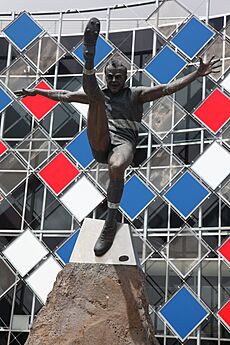
VFL players first played for Victoria in 1897. Victoria was very strong in these games. This was because many of the best players were in the VFL. In 1977, "State of Origin" rules started. This meant players played for the state they were from. This made games more even.
The AFL took over state football in 1993. They held an annual "State of Origin" series. But after 1999, the AFL stopped these games. Clubs didn't want to release their star players. Also, fewer people were interested.
In 2020, a special "State of Origin" match was played. Money raised went to communities affected by bushfires. Victoria played an All-Stars team and won.
Global Reach of the AFL
No professional leagues exist outside Australia. But the AFL wants to show Australian rules football to other countries. This helps the sport grow worldwide.
In 2010, Melbourne and Brisbane played a game in Shanghai, China. This was the first professional AFL game in China. Since then, AFL games have been played in New Zealand and China.
International Rules Series
The AFL has gained interest in Ireland. This is because of the International Rules Series. In this series, an Australian team plays against an Irish team. The game uses rules from both Australian football and Gaelic football. This series is the only way for AFL players to represent their country.
This series has encouraged young Irish players to try AFL. The AFL is a professional sport, unlike Gaelic football. Some Irish players have become very successful in the AFL.
How the AFL is Run
The AFL is run by a group of directors called the AFL Commission. This group was created in 1985. It replaced the old system where clubs elected directors. The Commission helps make sure the league runs smoothly.
The chairman of the Commission is Richard Goyder. The CEO of the AFL is Andrew Dillon.
The AFL also helps promote and grow the sport in Australia. It gives money to local leagues. It also runs the Auskick program for young boys and girls. The AFL also helps grow the game in other countries.
Players are represented by the AFL Players Association. Coaches have the AFL Coaches Association. Umpires have the AFL Umpires Association.
AFL Audience
The AFL is one of the most popular sports in Australia. Many people attend games. It is also one of the most-watched sports on TV.
TV rights for the AFL are shared between the Seven Network (free TV) and Foxtel (pay TV). In 2019, a record 1,057,572 people were members of an AFL club. In 2022, over 125 million people watched AFL games on TV. The 2023 AFL Grand Final was watched by over 5.7 million people.
Attendance at Games
The following shows how many people attended games in recent seasons:
| Year | Home and Away | Average | Finals1 | Average1 | Grand final |
|---|---|---|---|---|---|
| 2024 | 7,753,2512 | 37,4552 | 533,520 | 59,280 | 100,013 |
| 2023 | 7,474,684 | 36,110 | 664,780 | 73,864 | 100,0242 |
| 2022 | 6,112,431 | 30,871 | 639,980 | 71,109 | 100,0242 |
| 20216 | 3,976,228 | 19,209 | 272,746 | 30,305 | 61,118 |
| 20206 | 826,458 | 6,665 | 206,579 | 22,953 | 29,7077 |
| 2019 | 6,954,187 | 35,122 | 563,460 | 62,607 | 100,014 |
| 2018 | 6,894,772 | 34,822 | 700,3932 | 77,8212 | 100,022 |
| 2017 | 6,734,062 | 34,010 | 553,818 | 61,535 | 100,021 |
| 2016 | 6,311,656 | 31,877 | 558,343 | 62,038 | 99,981 |
| 2015 | 6,367,302 | 32,321 | 518,694 | 57,663 | 98,633 |
| 2014 | 6,403,941 | 32,343 | 570,568 | 63,396 | 99,454 |
| 2013 | 6,372,784 | 32,186 | 558,391 | 62,043 | 100,007 |
| 2012 | 6,238,876 | 31,509 | 538,934 | 59,882 | 99,683 |
| 2011 | 6,533,138 | 34,937 | 614,250 | 68,250 | 99,537 |
| 2010 | 6,494,564 | 36,901 | 651,764 | 65,176 | 100,0164 and 93,8535 |
| 2009 | 6,375,622 | 36,225 | 615,463 | 68,385 | 99,251 |
| 2008 | 6,512,999 | 37,0062 | 571,760 | 63,258 | 100,012 |
| 2007 | 6,475,521 | 36,793 | 575,424 | 63,936 | 97,302 |
| 2006 | 6,204,056 | 35,250 | 532,178 | 59,131 | 97,431 |
| 2005 | 6,283,788 | 35,703 | 480,112 | 53,346 | 91,8983 |
| 2004 | 5,909,836 | 33,579 | 458,326 | 50,925 | 77,6713 |
| 2003 | 5,876,515 | 33,389 | 478,425 | 53,158 | 79,4513 |
| 2002 | 5,648,021 | 32,091 | 449,445 | 49,938 | 91,817 |
| 2001 | 5,919,026 | 33,631 | 525,993 | 58,444 | 91,482 |
| 2000 | 5,731,091 | 32,563 | 566,562 | 62,951 | 96,249 |
| 1999 | 5,768,611 | 32,776 | 472,007 | 52,445 | 94,228 |
| 1998 | 6,119,861 | 34,772 | 572,733 | 63,637 | 94,431 |
| 1997 | 5,853,449 | 33,258 | 560,406 | 62,267 | 99,645 |
| 1996 | 5,222,266 | 29,672 | 478,773 | 53,197 | 93,102 |
| 1995 | 5,119,694 | 29,089 | 594,919 | 66,102 | 93,678 |
| 1994 | 4,723,023 | 28,624 | 514,375 | 57,153 | 93,860 |
| 1993 | 4,185,388 | 27,903 | 472,101 | 67,443 | 96,862 |
| 1992 | 4,332,917 | 26,260 | 481,348 | 68,764 | 95,007 |
| 1991 | 3,797,177 | 23,013 | 381,707 | 54,530 | 75,2308 |
| 1990 | 3,587,495 | 23,295 | 475,790 | 67,970 | 98,944 |
1 Finals total and Finals average include grand final crowds.
2 Record.
3 Capacity reduced due to MCG refurbishment.
4 Crowd for the drawn grand final.
5 Crowd for the grand final replay, played one week after the drawn grand final.
6 Attendance reduced due to the COVID-19 pandemic.
7 Capacity reduced due to the COVID-19 pandemic.
8 Waverley Park was used for the Grand Final due to the Great Southern Stand at the MCG being under construction.
Watching AFL on TV
Australian TV Coverage
AFL matches are shown in Australia by the free-to-air Seven Network and pay TV provider Foxtel. This deal runs until 2031.
The Seven Network shows about three-and-a-half games each week. This includes Friday Night, Saturday Night, and Sunday Afternoon games. They also show the AFL Finals and the Grand Final. Foxtel shows every match live on its Fox Footy channels. They also stream games on Kayo.
History of TV Broadcasts
The first VFL season was shown on TV in 1957. At first, only delayed replays of the last quarter were allowed. The VFL worried that live TV would stop people from going to games.
From 1974 to 1986, the Seven Network and ABC had exclusive rights. Seven has been a main broadcaster for many years.
In 2001, a group including the Nine Network, Network Ten, and Foxtel bought the rights. Games were split between them. Foxtel started its own channel, the Fox Footy Channel, which showed every game.
In 2006, Seven and Ten teamed up to win back the rights. This was a huge deal at the time. The latest deal, from 2025 to 2031, is worth $4.5 billion. It is the biggest sports TV deal in Australian history.
International TV Coverage
AFL games are shown in many countries around the world.
| Station/Channel | Countries | Free/Subscription | Home & Away | Finals | Grand final | Broadcasting since | Notes |
|---|---|---|---|---|---|---|---|
| ESPN Africa | Africa | Subscription | Three games per week (live/delay) | Live | See also Australian rules football in Africa | ||
| ABC Australia | East Asia Central Asia South Asia Southeast Asia Pacific Islands |
Free (may require subscription by selected operators) | Six games per week | Yes | Live | ||
| TSN2 | Canada | Subscription | Two games per week (live/replay) | Live | See also Australian rules football in Canada, AFANA | ||
| TSN5 | Canada | Subscription | One game per week (live/replay) | Live | See also Australian rules football in Canada, AFANA | ||
| Star Sports (China) | China | Subscription | Three games per week | Live | Live | See also Australian rules football in China | |
| Premier Sports Asia | China | Subscription | Two games per week | Live | Live | See also Australian rules football in China | |
| SportDigital1+ | Germany Austria Switzerland |
Subscription | Two games per week | Live | Live | See also Australian rules football in Germany | |
| Sky Sport 3 | New Zealand | Subscription | One game per week | Live | Live | See also Australian rules football in New Zealand | |
| Sky Sport 7 | New Zealand | Subscription | Five games per week | Live | Live | See also Australian rules football in New Zealand | |
| TNT Sports | United Kingdom Ireland |
Subscription | Nine games per week | Live | Live | See also Australian rules football in the United Kingdom | |
| Fox Sports 2 | United States | Subscription | Three games per week, some finals | Yes | Yes | 2013 | See also Australian rules football in the United States, AFANA |
| Fox Soccer Plus | United States | Subscription | Six games per week | Yes | Yes | See also Australian rules football in the United States, AFANA |
Listening to AFL on Radio
The first VFL game was broadcast on radio in 1923. The AFL has been on radio every year since then. Many radio stations broadcast games.
The AFL's main radio partners are:
- National:
- ABC Sport (across Australia)
- Triple M (in major cities)
- Community & Local:
- SEN SA Radio (Adelaide)
- FIVEAA Radio (Adelaide)
- 98.9FM Radio (Brisbane)
- K-Rock Radio (Geelong)
- 3AW Radio (Melbourne)
- 1116 SEN Radio (Melbourne)
- 6PR Radio (Perth)
Some Triple M stations focus on local teams. For example, Triple M Adelaide broadcasts only Adelaide and Port Adelaide matches.
Non-English Radio
Most radio broadcasts are in English. But some stations broadcast AFL in other languages. These include Arabic, Chinese, Greek, Hindi, and Spanish. Many also broadcast in Indigenous languages. This is because the sport is very popular among Indigenous Australians.
| Station | Language | State/territory | Reference(s) |
|---|---|---|---|
| Central Australian Aboriginal Media Association (CAAMA) | Arrernte | Northern Territory | |
| Top End Aboriginal Bush Broadcasting Association (TEABBA) | Tiwi | Northern Territory | |
| Yolŋu Radio | Yolŋu | Northern Territory |
AFL Online
The AFL's online partner is Telstra. The AFL website provides content for fans. Telstra also hosts the websites for all 18 AFL clubs.
Since 2012, Telstra has streamed live matches on its mobile network. Since 2019, Kayo has streamed almost every game live. For fans outside Australia, the Watch AFL service streams full games.
AFL Business and Fun
Sponsorships
The AFL has had different main sponsors over the years. Since 2004, Toyota has been the main sponsor.
The AFL Record is a magazine published on match days. About 225,000 people read it each week.
Memberships
The AFL sells memberships. These allow people to reserve seats at games in Melbourne. Members also get early access to finals tickets. There are different levels of memberships.
Merchandise
The AFL has stores that sell merchandise from all clubs. You can also buy merchandise from other shops.
AFL Video Games
There are many video games based on the AFL. Here is a list of some of them:
- Australian Rules Football (1989)
- Aussie Rules Footy (1991)
- AFL Finals Fever (1996)
- AFL 98 (1997)
- AFL 99 (1998)
- Kevin Sheedy's: AFL Coach 2002 (2001)
- AFL Live 2003 (2002)
- AFL Live 2004 (2003)
- AFL Live Premiership Edition (2004)
- AFL Premiership 2005 (2005)
- AFL Premiership 2006 (2006)
- AFL Premiership 2007 (2007)
- AFL Mascot Manor (2009)
- AFL Challenge (2009)
- AFL Live (2011)
- AFL (2011)
- AFL Live 2 (2013)
- AFL Evolution (2017)
- AFL Evolution 2 (2020)
- AFL 23 (2023)
- AFL 26 (2025)
AFL and Community
Supporting Diversity
The AFL supports the LGBTIQ community. They organize "Pride Games" to celebrate diversity and promote inclusion. The AFLW (women's league) has an official "Pride Round" each year. This round celebrates gender diversity and helps create a welcoming environment for everyone. The AFL has stated it will support any player who chooses to share their identity publicly.
The AFL also supported the creation of an Indigenous Voice to Parliament. This was to help recognize Indigenous Australians in the country's laws.
See also
 In Spanish: Australian Football League para niños
In Spanish: Australian Football League para niños
- Australian rules football attendance records
- History of Australian rules football in Victoria (1859–1900)
- Rivalries in the Australian Football League
- Sports attendances
- Lists
- List of VFL/AFL premiers
- List of VFL/AFL minor premiers
- List of VFL/AFL pre-season and night series premiers
- List of Indigenous Australian VFL/AFL and AFL Women's players
- List of VFL/AFL players born outside Australia
- List of VFL/AFL players by ethnicity
- List of current Australian Football League coaches
- List of Australian Football League grounds
- List of sports venues in Australia
- List of VFL/AFL presidents
- List of VFL/AFL records
- List of individual match awards in the Australian Football League


